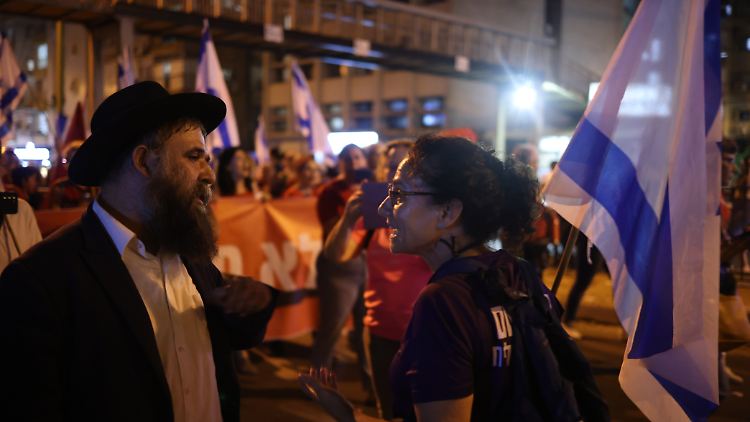“Let’s not be pushed aside”
Women protest in Tel Aviv’s Orthodox neighborhood
08/24/2023, 10:19 p.m
Israel’s right-wing religious government is increasingly alienating liberal women: Thousands of demonstrators are marching through a Tel Aviv suburb inhabited mostly by ultra-Orthodox Jews. One of the organizers is already thinking about emigrating.
According to media reports, thousands of Israeli women have demonstrated in a strictly religious Tel Aviv suburb for the preservation of women’s rights. In the evening they marched through the streets of Bnei Brak with protest signs and Israeli flags. Mostly ultra-Orthodox Jews live there. Occasionally there were minor confrontations, as reported by the Israeli media. Dozens of residents gathered for a counter-demonstration.
The organizers of the women’s protest accuse the right-wing religious government of wanting to “change the liberal character of Israel and transform it into a more religious, discriminatory, unequal country” with the help of a controversial judicial reform. This is shown, among other things, in “initiatives for gender segregation and the displacement of women from public space”.
One of the organizers is Lee Hoffmann Agiv. The 36-year-old has been active in the fight against the restructuring of the judiciary since the beginning of the year. Like many of her fellow campaigners, the wine merchant from a town north of Tel Aviv sees the government’s plan as a massive threat to women’s rights. “I’m angry, disappointed, worried.” The entrepreneur already took part in the first “March of the Maids” in Jerusalem. Women in long red coats and white hoods demonstratively walked through the streets – a well-known motif at the rallies. The eye-catching clothing is inspired by Margaret Atwood’s “The Handmaid’s Report” – the story of a dictatorship in which women in particular are oppressed.
The scene of the Kulturkampf is public transport
“We were 20 women on the first march,” says Hoffmann Agiv. “Today, tens of thousands of women are already marching.” That gives her hope. Dressing as a maid sends a “very strong message,” she explains. “People on the street – men and women – saw us and burst into tears. We will not allow anyone to oust us from the public eye,” says Hoffmann Agiv before the rally.
In recent weeks there have been repeated reports of attempts to restrict women in public spaces in Israel. These are an expression of a deep cultural divide between the country’s secular majority and an ultra-Orthodox minority. Although this only makes up 13 percent of the population, it is represented by influential political parties. Because of their large number of children, it is also the fastest growing group in Israel. It is estimated that within four decades they could make up a third. Public transport is often the scene of this culture war. According to media reports, for example, in the city of Ashdod, a bus driver directed a group of teenage girls to the back of a bus and gave them blankets to cover themselves. In another incident, a woman was reportedly barred from boarding a bus altogether.
After these cases, Netanyahu emphasized that Israel is a free country “in which nobody will restrict who can use public transport or dictate who sits where.” Hoffmann Agiv believes that he only reacted in this way because of the strong pressure from the protest movement and on social media.
The proportion of women in government is shrinking
Physicist Schikma Bressler, one of the figureheads of the months-long protests, said at the recent rally in Tel Aviv that they want a country based on the values of justice, freedom and equality. “A Jewish and democratic state in which women can sit where they want and wear what they want,” said the mother of five daughters. Ultra-Orthodox members of the government, on the other hand, want to expand the power of religious courts, which have only male judges.
Environment Minister Idit Silman from the right-wing conservative ruling party Likud is committed to ensuring that men and women are only allowed to swim separately in nature parks at certain times. However, this “pilot project” was initially stopped by Attorney General Gali Baharav-Miara. She is regarded as a representative of liberal, Western values, and has become a figure of hatred for many members of the government.
Fewer than a fifth of ministerial posts in Israel are held by women. In the previous government of the current opposition leader Jair Lapid, it was still a third. Even within the ministries, there are hardly any women in top positions. May Golan, a minister responsible for women’s rights in the Netanyahu government, is opposed by the protest movement. She supports judicial reform and critics accuse her of not really working to improve the situation of women in Israel.
“Dialogue is possible”
With the march to Bnei Brak, the demonstrators wanted to ring alarm bells. “Many ultra-Orthodox have no access to the media,” explains Hoffmann Agiv. “They must see us, our pain, our anger.” She thinks a dialogue is possible. She emphasizes that the march is not intended as a provocation. “Whoever says that women in public space are a provocation has a problem.”
Her two daughters, aged four and seven, also give her motivation for her grueling struggle. “The three of us also have German citizenship,” says Hoffmann Agiv. You have already thought about leaving Israel. “But right now our fight isn’t over, that’s why we’re here,” she says. “My older daughter already understands that I am fighting for her future and that of her little sister. I will not raise my children in a dictatorship.”
